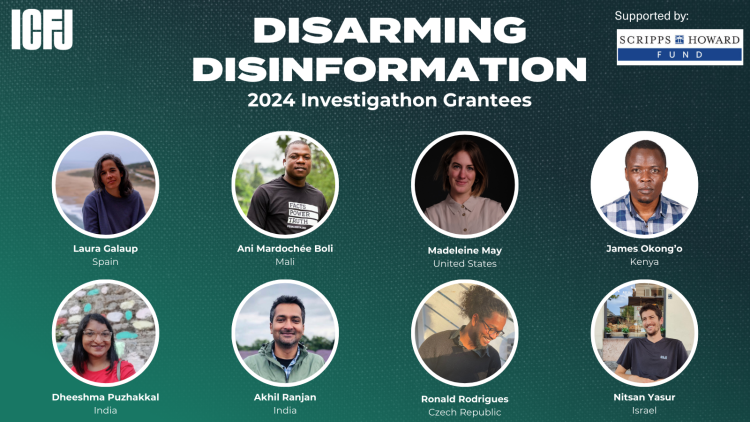Investigative reporting teams across four continents are working with ICFJ’s support to expose the sources and money behind electoral disinformation campaigns, in a pivotal year for democracy when more than 2.6 billion people are expected to go to the polls.
The teams are investigating the individuals, organizations and financing behind “digital mercenaries” in sub-Saharan African elections, political proxy pages on Facebook in India, far-right disinformation campaigns in the U.S. and Europe, and more.

To pursue the investigations, lead reporters for each project are receiving funding, training and mentorship through the Disarming Disinformation program. The initiative is run by ICFJ and funded by the Scripps Howard Fund, which supports The E.W. Scripps Company’s charitable efforts. The three-year project is empowering journalists and journalism students to fight disinformation.
“These investigations are a critically important public service, at a time when bad actors are misleading voters at a scale never before witnessed,” said Paul Rothman, the ICFJ senior program director who oversees the Disarming Disinformation initiative. “Through these investigations, we hope to surface trends in electoral disinformation across borders and regions, and to identify effective strategies for uncovering the actors and financing behind them.”
The reporting teams working on the investigations are affiliated with 24 news outlets. More information on the eight journalists leading the projects – who are from the Czech Republic, India, Israel, Kenya, Mali, Nigeria, Spain and the United States – can be found here.
The projects were selected to receive funding after an “Investigathon” in March in Tbilisi, Georgia, with 15 investigative journalists representing 11 countries. The journalists workshopped their investigations with mentors, including Patricia Campos Mello, editor-at-large and columnist at Folha de S. Paulo in Brazil; Giannina Segnini, Costa Rican investigative journalist and current professor at Columbia University’s Journalism School; Craig Silverman, investigative reporter at ProPublica; and Laura Zommer, ICFJ Knight Fellow and co-founder of Factchequeado.
Participants said the focused time with expert mentors and peers allowed them to refine their story ideas and develop methodologies for their investigations. They also discovered open-source tools and how to tailor them to track down certain information. Many said that connecting with colleagues from across the world was hugely beneficial.
“It's been really helpful to be in a group where we can identify what the similarities are, because not only are the issues similar, but the tools that we can use to try to explore them and investigate them are also in common,” said Madeleine May, an investigative producer with CBS News in the United States. “So there is a lot to learn from the attendees and also the mentors.”
Campos Mello, one of the ICFJ mentors, echoed this observation.
“Things that we have seen in Brazil are happening in India, are happening in Nigeria, are happening in so many other places,” she said. “That's why it's so important that we sit down and we exchange both digital tools that we can use, but also what are the narratives that are being spread around the world? And what are the strategies of these people who are disseminating disinformation?”
Ani Mardochée Boli, who is leading one of the ICFJ-backed investigations, said the lessons from the Investigathon were so valuable he wants to ensure others benefit from them, too.
“I said to myself, ‘But wow, this is something that I must also bring back home in Mali and see to what extent I can perhaps deepen this knowledge and share this knowledge with others,’” said Boli, a fact-checker with PesaCheck.
This year’s investigations build upon the previous year’s investigations as part of the Disarming Disinformation program, which uncovered disinformation campaigns in the Americas related to immigration, climate change and electoral interference.
The Disarming Disinformation initiative also recently wrapped up the Empowering the Truth Global Summit, a series of online trainings in March that focused on how journalists and fact checkers can outpace misinformation by disseminating reliable, trustworthy content in innovative ways, including through the use of AI tools and new technologies. More than 2,020 participants from over 130 countries joined 32 sessions in seven languages.